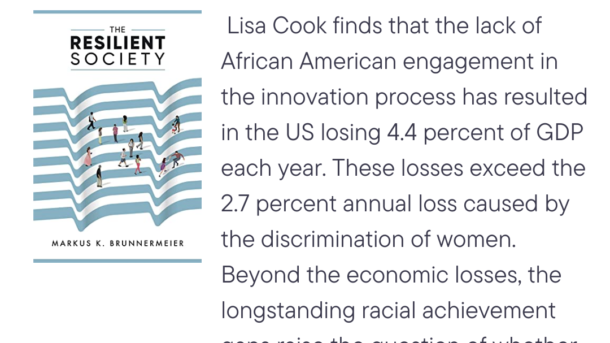The racial wealth gap spills into entrepreneurial inequality. More than a third of US small businesses rely at some point on a gift from family members or friends. Because of the large racial wealth gap, African American entrepreneurs are significantly less likely to receive this kind of support. Runway Social Finance, based in San Francisco, California, aims to address this problem. They provide funding to small businesses, including to those owned by African Americans, under the sole condition that they have a strong business plan. The general lack of business investment support for African Americans illustrates how resilience inequality can exacerbate economic inequality. If African American entrepreneurs are less resilient due to smaller buffers, a temporary recession can cause permanent scarring effects among minority communities. The lack of resilience might inhibit risk-taking, which leads to less innovation. Despite the disproportionate hardships faced by minority communities during the pandemic, the evidence so far suggests that money from US fiscal relief measures was not particularly aimed at reaching them. The main program (PPP) targeted businesses, and it was administered by banks. However, minority entrepreneurs disproportionately use financial technologies (fintech) to manage and access their finances. Thus, many were left out of the PPP distributions. Counties with the highest shares of Black business owners did not receive equal PPP funds. To make matters worse, African American businesses had weaker balance sheets with higher leverage before the Covid-19 crisis started. A common cause of these inequities is systemic racism. Lisa Cook finds that the lack of African American engagement in the innovation process has resulted in the US losing 4.4 percent of GDP each year. These losses exceed the 2.7 percent annual loss caused by the discrimination of women. Beyond the economic losses, the longstanding racial achievement gaps raise the question of whether we as a society can be really free if there is no equal opportunity.
Probably almost everyone would agree that we would need more entrepreneurship and new businesses to have a more resilient society. But what if it is the case that only a selected group of people are more likely to even engage in starting their own businesses, especially with an even higher chance of success? That disparity actually leads to further inequality and might make it harder to unify different groups of people in your society.
While most people like to push for the typical narrative of the “do or die” founder that lived on instant noodles and slept on couches, one of the biggest factors for success is actually being able to access funds through a solid family background or friends network. Perpetual scarcity don’t usually lend towards the best decision making, so having a safety net helps people get started and plan their business for the long term.
This also reminds me how general subsidies to promote “entrepreneurship” might not really help to solve inequality. After all, the people whom are best able to access these subsidies or cash are the ones whom are already more savvy or well connected. In my opinion, to have better entrepreneurial equality, whats important is raising the floor and making sure that people can think about more than just working for basic survival. This way, the ones whom always have wanted to start a business will have more headspace and opportunities to do so.



